Sourcing Spotlight: Taking a Closer Look at Coffee
20 August 2024
Share this exclusive content from Saladplate
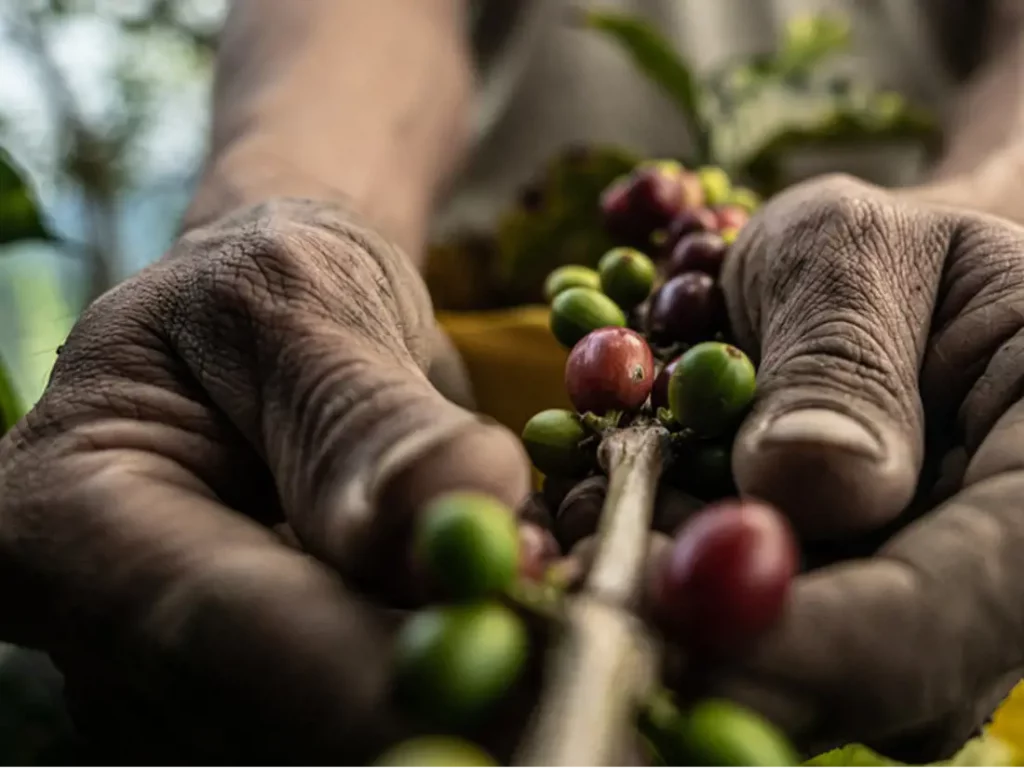
ASOBRIS Coffee, Colombia.
Photo credit: Juan Nicolás Becerra Manrique/ Fairtrade
COFFEE PRODUCTION IS PLAGUED WITH SOCIAL, ECONOMIC AND ENVIRONMENTAL ISSUES, AND IT CAN BE DIFFICULT TO KNOW WHERE TO START IN TERMS OF ASSESSING YOUR SOURCING SUSTAINABILITY. THIS ARTICLE PROVIDES AN OVERVIEW INTO THIS COMPLEX AREA AND SOME ACTIONS YOU CAN TAKE TO MAKE YOUR COFFEE SOURCING MORE SUSTAINABLE.
From gender inequality and exploitative pay to deforestation and the effects of the climate crisis, read on to learn about the social, economic and environmental problems in coffee production.
SOCIAL AND ECONOMIC ISSUES IN THE COFFEE INDUSTRY

UNFAIR PAY
Low remuneration is an ongoing problem across the industry. Max Milward, Sustainable Sourcing Manager at Fairtrade, says, “Coffee is the most popular drink – and one of the most traded commodities – in the world. However, despite its huge popularity, the 25 million smallholder farmers who produce coffee beans often have little negotiating power in global supply chains. What’s more, low prices and a volatile international coffee market mean huge pressure on farmers’ ability to maintain a decent standard of living. Indeed, few farmers earn a living income from coffee production.”
“The vast majority of coffee producers find themselves in a powerless position, having to accept the prices they are offered, even when these prices are below their production costs,” adds Roland Glew, Green Coffee Buyer at Ozone Coffee. “With minimal access to credit, they are unable to improve their situation.” Not only is this a problem in itself, but it also serves to exacerbate other issues and makes it impossible for many farmers to embrace more sustainable agricultural methods.
“Most coffee producers aspire to farm sustainably, aiming to reduce inputs, build biodiversity and create healthier farms to pass on to their children,” Glew continues. “However, the lack of access to information and the insufficient prices paid for coffee – often not even covering the costs of intensive farming, let alone those of [the transition to] sustainable methods – are major obstacles.”
LACK OF ACCESS TO EDUCATION
“Each coffee-producing country faces its own unique challenges,” says Glew, “but a common issue across the board is the historic lack of transparency and information sharing in the coffee industry. In addition to significant economic disadvantages, most coffee-producing communities lack access to vital information on agronomy, business practices and the workings of the coffee supply chain. They often do not know what roasters and end customers want. Many farms are family-owned, like in the UK – but, while many British farmers’ children can study business and agriculture at university, this opportunity is rarely available to coffee-producing families.”
GENDER INEQUALITY
This lack of access to education is even more pertinent for female coffee farm owners, farm workers and those on a family farm owned by a male relative, for whom the challenges of coffee production present a steeper hill to climb. “Female-produced coffee is in more demand in recent years,” says Ghilyon Welby-Watson, Head of Coffee by Tate, “but sometimes, I feel that this is nothing more than a surface level achievement for companies to shout about.”
In reality, while up to 70% of the labour in coffee production is provided by women, only 20-30% actually own their assets – figures highlighted in a 2018 report from the International Coffee Organization. This report shows that, compared to men, women in the coffee industry have systematically lower access to resources like land, credit and information. This creates a measurable gender gap in economic outcomes, including yields, productivity and farm income; women are also disproportionately affected by economic shocks and climate change.
HUMAN RIGHTS ISSUES
Unfortunately, while some progress has been made, instances of child labour, forced labour, discrimination and workplace harassment can still be found in the coffee industry, as well as in the production of many other foods.
INCREASED PRODUCTION COSTS
“Production costs have risen hugely in the last few years,” says Welby-Watson, mentioning a 2022 trip to Colombia as an example. “One of the producers we met was Avelino Mena, at his farm El Guadal. We learned that his production costs went from 50,000 to 110,000 pesos per arroba (12.5kg parchment) in just two years. As of time of writing (August 2024), the price is currently 201,500.” This is largely a result of steep rises in inflation since the pandemic, in the costs of everything from labour to farm equipment, and makes it even harder for farmers already struggling with tight margins.
AN UNCERTAIN FUTURE FOR THE INDUSTRY
Glew points to another significant social challenge: the ageing population of coffee producers. For the reasons outlined above, there are few – if any – compelling reasons for younger generations to remain in the family business. “Few young people choose to stay in coffee production, often opting to move to cities or other countries like the US,” he says. Without a marked change in how difficult it is to make a reasonable income from farming and selling coffee, the future of the industry remains deeply uncertain.
ENVIRONMENTAL ISSUES IN COFFEE PRODUCTION
CLIMATE CHANGE
In terms of driving biodiversity loss, the climate crisis has real ramifications for coffee, just like any other plant. In 2019, coffee was placed on the IUCN Red List as an Endangered species, largely due to climate change projections. According to a study by London’s Royal Botanic Gardens, wild arabica coffee could vanish completely by 2080.
The upshot is that the climate crisis will be devastating for coffee producers. “Even slight differences in temperature and rainfall can drastically affect farmers’ crops, increasing production costs and causing smaller yields,” says Welby-Watson, citing Peru as an example: this year, the country has seen an earlier harvest due to more sun, while plants are flowering earlier due to heavier rainfalls.
Milward has further examples to add. “In 2024 alone, coffee farmers have seen major crop damage from prolonged heatwaves in Vietnam, and in Brazil, coffee harvests have been impacted by heavy rainfall. On top of unseasonal weather, the impact of climate change brings with it more pests and faster-spreading diseases. In fact, experts predict that by 2050, up to 50% of the world’s surface area currently used for coffee production may no longer be suitable.”
Robusta coffee is often cited as a more resilient alternative to the highly prized arabica. However, in 2023, a team of researchers at the University of Southern Queensland concluded that it is far from a climate-proof solution. Looking to explore long-held assumptions about robusta’s optimal temperature bracket – usually quoted as 22-30°C – they found that these data were not only based on just one specific area in Congo, but were over 400 years old, gathered on 16th century botanical expeditions. Using a large (modern) data set across a 10-year research period, they found that robusta’s actual ideal temperature is below 20.5°C. It can no longer be hailed as the future of coffee farming. While this may lead to the establishment of coffee growing in new areas, this in itself will come with its own challenges.
DEFORESTATION
Coffee plants naturally grow in shady conditions under tree canopies. However, coffee grows faster in sunlight and so, to obtain faster yields and increase revenue, the industry has been moving towards sun-grown coffee, which requires the clearing of forested areas. This is now a major source of deforestation; some estimates say that every cup of coffee consumed destroys roughly one square inch of rainforest.
The clearing of forests has big repercussions in biodiversity loss and carbon emissions. Sun-grown coffee also requires more chemical pesticides, fertilisers and fungicides, degrading the fertility of the soil over time and rendering the land unusable for future coffee-growing generations – which leads to more deforestation down the line.
The European Union’s Regulation on Deforestation-Free products (EUDR) came into force in June 2023. From 30 December 2024, any operator or trader placing these commodities on the EU market, or exporting, must prove they do not originate from deforested land. The scope of the regulation includes coffee as well as derived products, such as roasted coffee.
Because of this, measures will need to be taken to ensure coffee imported or exported in the EU is:
- deforestation-free,
- produced in line with the relevant legislation of the country of production, and
- covered by a due diligence statement indicating no more than a negligible risk of non-compliance.
HOW CAN THE HOSPITALITY INDUSTRY SOURCE COFFEE RESPONSIBLY?

Here are some of the actions you can take when sourcing coffee for your F&B business.
LOOK FOR THIRD PARTY CERTIFICATIONS
Choose suppliers who are committed to tracing and verifying the origins of their products and who will keep you informed when there is a relevant change in the supply chain. This applies to social issues like fair terms of trade as well as environmental issues like deforestation. As always, we recommend sourcing products with impartial and trustworthy third-party certifications, as this provides great peace of mind. Best practice would be to seek certifications that cover both environmental and social impact.
Organic certification is a great way to ensure that the environmental impact of production is minimised. You could combine this with Fairtrade and/or the Rainforest Alliance – both good labels to look for when it comes to coffee, and especially when it comes to safeguarding against the social issues prevalent in the industry.
Fairtrade aims to provide financial stability to coffee farmers by offering a Fairtrade Minimum Price, which protects them from sudden price drops. Coffee grown using organic methods receives an additional price incentive. The farmers also receive a Fairtrade Premium – an extra sum of money paid on top of the selling price that they can invest in business or community projects of their choice – and a set portion of this Premium goes toward improving production or quality. By supporting smallholder farmers to organise themselves into cooperatives and associations, farmers can also negotiate better terms of trade and reach wider markets.
The Rainforest Alliance does some fantastic work towards providing long-term solutions to many of the problems we’ve discussed above. The Alliance has adopted a risk-based assess-and-address approach that promotes human rights through prevention, community awareness and engagement, and continuous improvement. They also promote adaptations to climate change and sustainable farming methods on a tailored, local level, supporting and educating coffee producers on what will work in their specific situation, rather than taking a one-size-fits-all approach. Furthermore, the Rainforest Alliance not only prohibits deforestation, but the destruction of all ecosystems. Farmers must increase native tree cover, provide geolocation data for risk maps that show deforestation hotspots, and more.
CHOOSE SPECIALTY GRADE
“Don’t buy commodity coffee,” says Glew. “Instead, purchase specialty coffee, preferably with the name of the producer on it. While this is not a perfect solution – not all specialty coffee is traded ethically or sustainably – all commodity coffee should be considered unsustainable.”
Welby-Watson agrees. “At Tate, we source specialty grade coffee to supply the gallery. Not only does this mean the quality of coffee is the highest, but it means that the price paid to producers is considerably higher and fairer in comparison to commercial grade coffee. Fairer pricing helps invest in agriculture, production, training, welfare, etc. If businesses continue to buy specialty coffee, that is a step in the right direction. “
KEEP GENDER EQUALITY IN MIND
As explained in the ICC report on Gender in the Coffee Sector, “The gains from closing the gender gap are significant and there is a role for both the public and the private sectors, as well as consumers, in fostering empowerment and achieving gender equality.” Gender-sensitive policies and programmes and sustainable supply chain policies can empower women and increase access to assets, finance, education and skills – ultimately enabling women to achieve better yields and higher profits. Improving women’s resilience to economic shocks and climate change fosters the long-term sustainability of rural livelihoods and the coffee supply as a whole.
For hospitality businesses, this means making gender a key consideration when evaluating your supply chain. “At Tate, we source through our gender equality project and have maintained long term partnerships with repeat producers that we’ve supported for up to nine years,” says Welby-Watson. It may also mean contributing directly to projects and programmes that seek to address these gender inequalities; the Rainforest Alliance’s certification programme provides tools to help producers understand and address gaps in gender equality in operations.
A STORY OF COFFEE: SHARED IMPACT
Despite broad recognition throughout the coffee industry that action is required to tackle these serious risks, most coffee farmers still live in poverty. To address these risks, Fairtrade has developed a pioneering new initiative, Shared ImPact, which enables hospitality businesses to work together, rather than individually, to tackle the challenges facing coffee farmers.
Through Shared Impact, F&B businesses can collaborate by focusing their sourcing and making long-term commitments to specific pools of Fairtrade coffee producer organisations. The producer organisations, in turn, can increase their Fairtrade sales and earn more Fairtrade Premium as a result.
Long term commitments to coffee producers’ organisations mean more meaningful investment in sustainability initiatives and allow coffee businesses to target salient risks in their supply chain.
“My wish is for as many hospitality businesses as possible to come together to prioritise sustainable purchasing practices by establishing long-term commitments and paying fair prices to coffee farmers,” says Milward. “If anyone would like to talk with me about the Shared Impact initiative, or Fairtrade’s work with coffee in general, they can reach me at [email protected].”
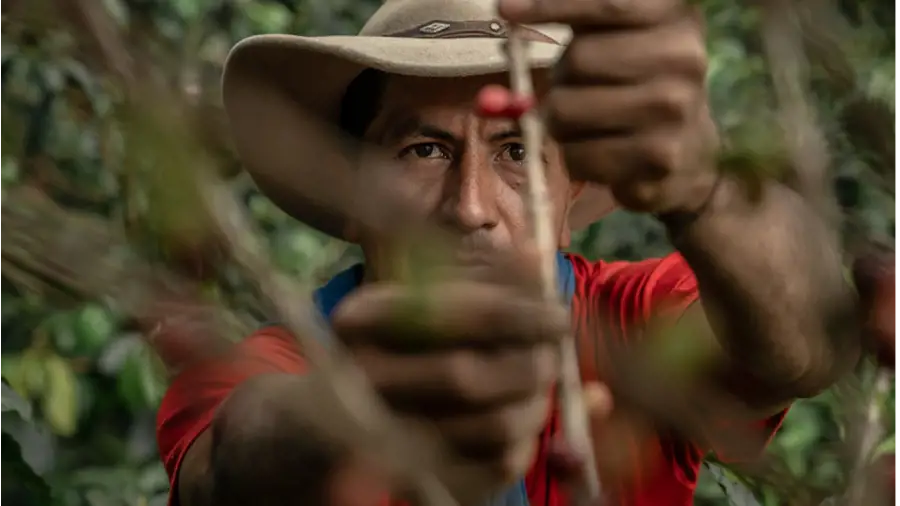
Coffee producer Norvey Vaquiro.
Photo credit: Juan Nicolás Becerra Manrique/ Fairtrade
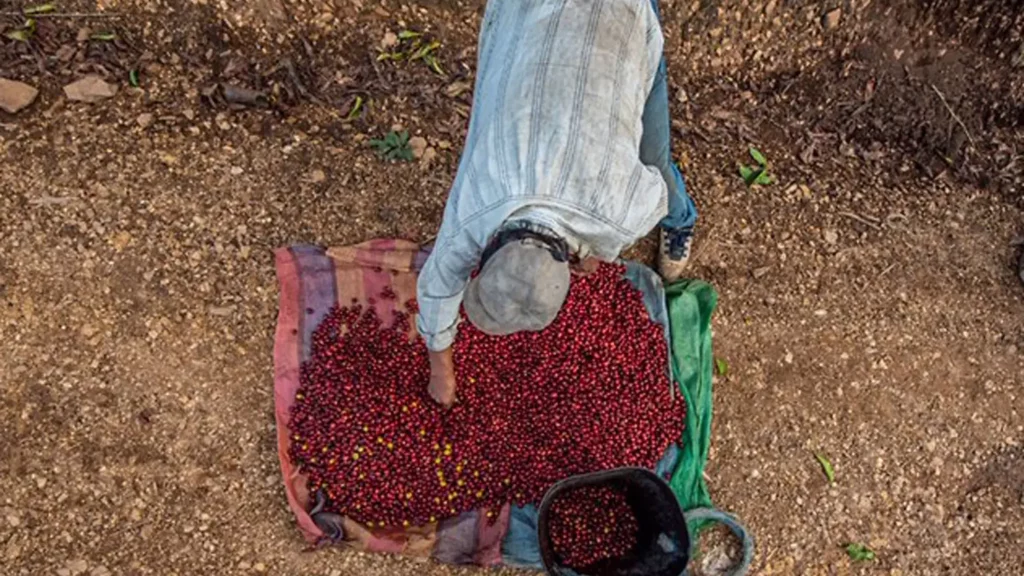
Don Carlos Coffee, Bolivia.
Photo credit: Ozone Coffee
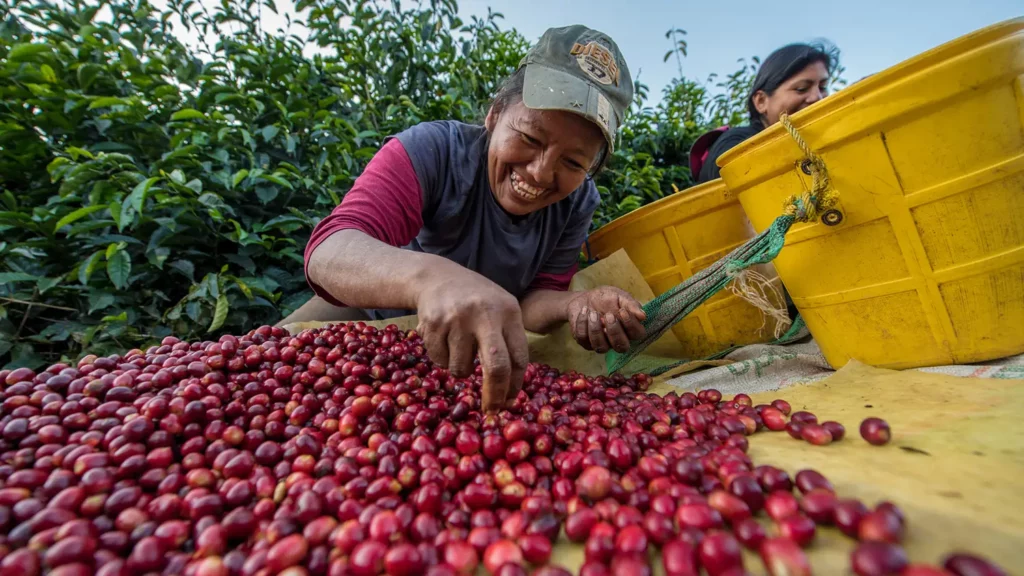
Waliki Coffee, Bolivia.
Photo credit: Ozone Coffee
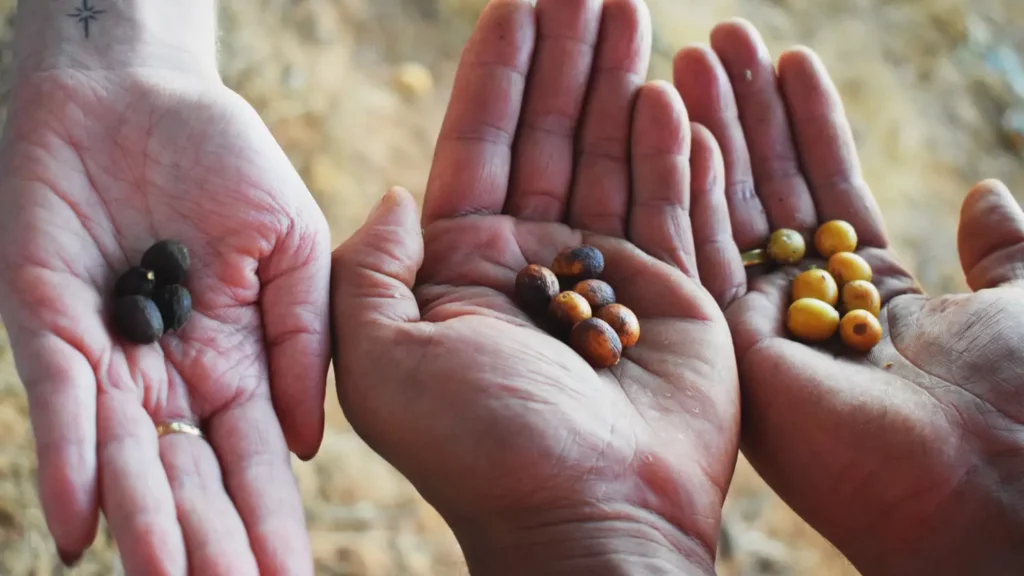
Photo credit: Coffee by Tate
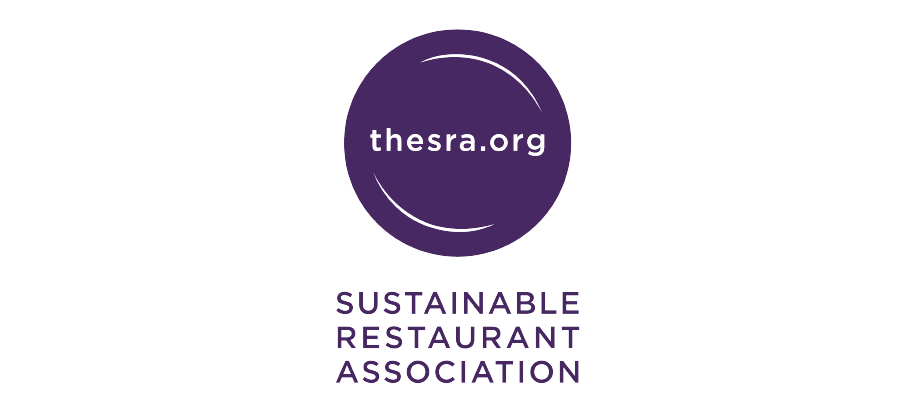
Source: The Sustainable Restaurant Association



